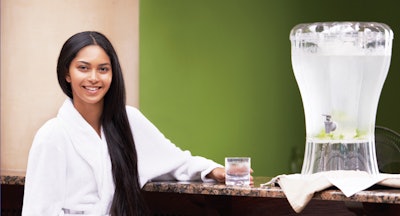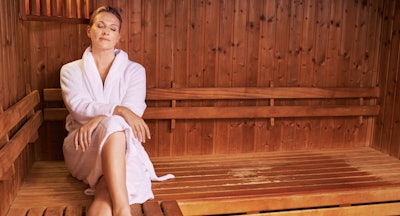 [Images: Getty Images]
[Images: Getty Images]In the oversaturated markets of diet and detoxification, it can be a bit overwhelming for spa owners, let alone their clients, to determine what’s factual. With such a range of impressive claims—detoxing is alleged to help with weight loss, skin conditions, energy levels and rid the body of internal impurities— it’s no wonder people are turning to their trusted skincare and wellness experts for information about the process. Which, of course, means you need to position yourself as an expert.
For starters, understand that toxins themselves are not a myth. “We come in contact with environmental toxins on a daily basis,” says Alicia Armistead, B.S., D.C., and founder of Healing Arts NYC in Fairfield, Connecticut, and Brooklyn and Manhattan in New York. “A healthy body will be able to handle toxins entering its system and then flush them. But over time, with such high levels of exposure, the body can have difficulty detoxing at the rate it needs to, which is why toxins build up.” Simply going about our daily lives exposes our bodies to toxins, says Washington, D.C.-based Ashley Koff , R.D., and founder of the Ashley Koff Approved method for healthy living. “We are designed with a detoxification system for a reason—it’s an ongoing part of staying healthy,” she explains.
RELATED: Cupping to Relieve Back and Neck Pain
Then there are all the questions that clients will ask. Why, and how, do toxins stay in our systems? If our liver and kidneys are functioning properly, why is detoxing necessary? Is embarking on an all-liquid diet actually good for your body? In an effort to distinguish truth from falsehood, we picked the brains of dietary experts, spa professionals and supplement formulators to ensure you have all the information you need to properly inform your clients.
Test yourself with these six true or false questions about detoxing.
1) Our organs, blood, skin tissue and urine accumulate toxins?
True: Throughout the day, humans inadvertently ingest and expose their bodies to a multitude of substances. “There are hormones in our dairy and meat, pesticides on our food, chemicals in our cleaning products and pollutants in the air. As hard as you try to circumvent these, it’s impossible to avoid them entirely,” explains M’lisa Jackson, president of M’lis.
The skin is the body’s largest barrier, and though it does an effective job of keeping environmental toxins out, plenty still enter. “Our blood ‘sees’ everything; when we eat something, or something is introduced into our system, it’s either digested or absorbed, then processed into our bloodstream,” explains Katherine Zeratsky, R.D.N., at the Mayo Clinic in Rochester, Minnesota. Our organs are designed to help us process all of the elements, good and bad, within our blood. “If the organs of elimination—the lungs, kidneys, digestive tract, liver and skin—aren’t working properly, the body is left with a buildup of compounds,” expounds Jamey Wallace, N.D., chief medical officer at the Bastyr Center for Natural Health in Seattle. We all have some by-products from normal metabolism left in our bodies, agrees Ronald Moy, M.D., formulator of DNAEGF Renewal skin care. “Over time, toxins like mercury and arsenic accumulate and become stored in our fat cells,” he says.

2) Drinking large quantities of water can alone detoxify the body?
False: Many people believe that consuming large quantities of water (more than the typically recommended eight 8-ounce glasses, which equates to 2 liters, daily) can “flush” their systems of toxins entirely. “Drinking water does aid in the elimination of toxins that are converted to be—or started as—water-soluble,” clarifies Koff . “Drinking water is important to dilute toxins,” adds Dr. Wallace. “It helps the kidneys filter the blood and excrete by-products of metabolism from the blood more efficiently. It’s also imperative to help the bowels move regularly.”
RELATED: Why Rose Is a Skincare All-Star
Zeratsky helps clients understand the notion of flushing their systems by using an analogy about drinking alcohol. “When people consume alcohol, they sometimes drink a lot of water in an attempt to lessen the effects. That’s fine, but your liver still has to process the chemicals from the alcohol, and water just helps facilitate that,” she says. Rosemary Davila, spa director at SiSpa at the Palm Beach Marriott Singer Island Beach Resort & Spa in Florida, reminds that most people don’t need more than 2 liters of water per day, unless they’re exercising or perspiring heavily, and should simply pay attention to their body’s needs. “Drinking too much water can actually create an electrolyte imbalance, which may lead to cardiac problems,” she says.
3) Liquid diets can be an effective detox method?
True: This statement remains true only if the liquids provide all of the important nutrients that support detox. M’lis manufactures a Total Body Cleanse system, and Jackson emphasizes that those who use the products aren’t robbing their bodies of nutrients. “It’s not a fast and they’re not starving— participants are ingesting calories, and the cleanse is just a chance to let the body use its energy to digest and clean up what’s already present,” she says. Koff agrees that a liquid diet can be helpful, as “it doesn’t require extra digestive efforts, so the body can work on detoxification,” she explains. “Conversely, if the liquid doesn’t contain nutrients that support detox, or if it inadvertently includes toxins itself (such as pesticide residues from non-organic produce), the participant could be unwittingly adding to their toxin load.”
Zeratsky points out that juice-only diets can potentially deprive the body of necessary nutrients. “Clients aren’t getting adequate protein or essential fats that they need in order to function,” she says. “The body needs protein to have a working immune system as well as healthy hormone and enzyme levels.” Davila advises guests to have blood work done before undertaking a liquid diet, which should last a maximum of three days. “Be sure they’re supplementing their diet with electrolytes, and that the juice they’re drinking contains some natural sugars,” she advises.

4) Sweating, either from exercise or heat therapy, can entirely rid the body of toxins?
False: Only toxins that are water-soluble can be effectively sweat out but, notes Jackson, sweat-inducing activities are good for the body. “Dry saunas, steam rooms and cardiovascular activities are great; sweating is one of the ways our bodies detoxify,” she says. Maria Schalkoff , colon hydrotherapist and lymphatic therapy specialist at Provence Wellness Center in New York City, explains that the skin acts almost like a third kidney. “It’s our thermo regulator; when the body contains too many toxins, our skin helps eliminate them and evacuate waste products through its sweat glands,” says the spa pro, who encourages her clients to take infrared saunas. “Always be sure that they rehydrate afterward,” she adds.
5) Certain nutrients bind to, and help eliminate, toxins; therefore, a healthy diet is enough to keep us toxin-free?
False: There are a range of specific ingredients—among them bentonite clay, burdock root, charcoal, chlorella, dandelion root, fiber, glucoraphanin and sarsaparilla root—renowned for bonding to or encouraging the body to eliminate toxins. “Nutrients like glucoraphanin, the highest concentration of which is found in broccoli florets and Brassica Tea, are essential for converting fat-soluble toxins into water-soluble toxins,” says Koff . Dr. Moy formulates his supplements with chlorella, which is rich in chlorophyll and vitamins A and B3. Fiber, points out Jackson, is also extremely effective as it acts like a bulking agent that binds to particles. “It makes you feel full, absorbs whatever is around it and vacates your digestive system,” she says. “Generally, fruits and vegetables have a lot of fiber, high water content and a range of antioxidants, vitamins and minerals,” adds Zeratsky. “Good nutrients occupy the body’s receptors and enter cells through diffusion, creating a hospitable environment within the cell,” explains Davila. “When this happens, toxins have nowhere to go and are eliminated instead.”
RELATED: Aquatic Healing Retreat at Hotel Café Royal’s Akasha Holistic Wellbeing Center
Although a well-balanced, healthy diet of natural foods keeps the body healthy, we’re inevitably exposed to environmental toxins that penetrate our skin and end up in our bloodstreams. Professionals advocate for supplementary elimination methods, some more drastic than others. “Clients should release stress, clean their colons with colonics and put their lymphatic systems in motion with lymphatic therapies,” recommends Schalkoff.
6) Encouraging your clients to experience multiple therapies and consider a range of lifestyle factors is the best way to help them reduce their toxic load?
True: Most experts agree that everything in moderation is fundamental—a combination of heat therapy, body wraps, massage, exercise, a healthy diet and lots of fluids. “Solely drinking several liters of water or sitting in the sauna is only a fraction of a whole picture,” says Zeratsky. “The foods you eat, how much you exercise, what you expose yourself to, your stress levels—it’s all part of a multi-disciplinary system.”
Jackson advices everyone she works with to exercise as regularly as possible. “Do something to break a sweat once a day,” she says. “It’s a great way to keep your body clean, get your heart rate up, engage your cardiovascular system, and build flexibility and strength. Sweating is part of what keeps you healthy and well.” Heat therapy and wraps, reminds Schalkoff , are not the be-all and end-all. “These are temporary measures that remove excess water and help to kick-start the detox process,” she says. “And supplements are good, but they are just that— supplements. They support a healthy lifestyle.”
Zeratsky advises spa pros to remind their clients that they don’t need to hit every single mark. “It’s not all or nothing; some people may only be able to achieve four or five of these objectives, and that’s okay,” she says. “The goal isn’t perfection; you’re just looking for an improvement.”
–by Rachel Kossman











